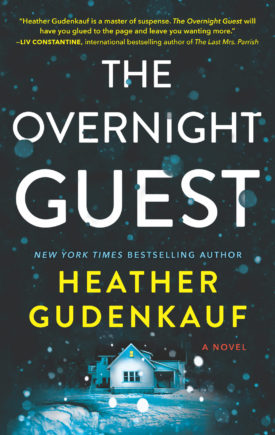 Synopsis:
Synopsis:
She thought she was alone . . . but she receives an unexpected visitor during a deadly snowstorm.
True crime writer Wylie Lark doesn’t mind being snowed in at the isolated farmhouse where she’s retreated to write her new book. Stocked cupboards, a cozy fire, complete silence . . . she’s ready to hunker down during the raging snowstorm.
It would be perfect, if not for the fact that two decades earlier, in this very house, two people were murdered in cold blood. And a girl disappeared without a trace.
As the storm worsens, Wylie finds herself trapped inside the house, haunted by the secrets contained within its walls — and haunted by secrets of her own. Then she discovers a small child outside in the snow. Bringing the child inside to warmth and safety, she searches for answers.
Soon it becomes clear that the farmhouse isn’t as isolated as she thought . . . and someone is willing to do anything to find them.
Review:
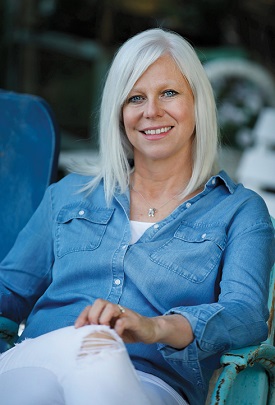
New York Times and USA Today bestselling author Heather Gudenkauf was born in Wagner, South Dakota, but when she was just a month old her family returned to the Rosebud Indian Reservation where her father worked as a guidance counselor and her mother served as a school nurse. Three years later, they relocated to Iowa, where she continues residing with her family. Gudenkauf was born with profound unilateral hearing loss which caused her to retreat to books, sometimes curled up in a toy box with a pillow, blanket, and flashlight. It’s not surprising that her love of reading blossomed into a love of writing.
Gudenkauf says she usually finds inspiration for her books from news stories. She happened upon the story of a nineteen-year-old woman whose car became stuck in a ditch full of snow. Rather than remain in the vehicle, she started walking. The temperature was twenty degrees below zero and she was two miles away from help. She made it to her destination, but collapsed on the doorstep. She was discovered some hours later, near death. Her eyes were frozen open and she “was so cold that the hypodermic needles doctors used to try and treat her kept breaking,” Gudenkauf relates. But she survived. “When I read this account, I knew I had to include it in my next book somehow,” Gudenkauf says. So, in her ninth novel, The Overnight Guest,”the main character finds a young child in the snow, which is the catalyst for all that happens next.”
The book is an exploration of a brutal crime committed two decades ago, and the myriad ways it shaped and destroyed lives. To relate the story, Gudenkauf employs three separate narratives. She says she loves “writing stories from multiple points of view and shifting timelines” and felt this book, in particular, required that approach.
In the present, Wylie Lark, a true crime author completing her fourth book, has retreated from her troubled relationship with her son to an isolated farmhouse in Iowa. The house, the site where the crime she is currently writing about, has no television or WiFi. Since Wylie has dropped and destroyed her cellular phone, she is without internet access and must rely on a landline to communicate. There’s a blizzard on the way, but she has sufficient food, firewood, and a 9 mm handgun to keep her warm and safe. Despite her profession, Wylie doesn’t “like the dark and what might be lurking outside after the sun went down.” She also has Tas, a coonhound mix she found sitting outside the farmhouse’s door, to keep her company as the storm rages, although at first they don’t like each other much.
A second narrative — which Gudenkauf says was the first one she drafted because it “allowed me to get to know the characters, the crime, and how it impacted the community” — is set in the summer of 2000 and focuses on Josie Doyle, age twelve. She is growing up on her family’s farm in Blake County, Iowa, outside Burden. “Despite its grim name, Burden, population 844, was known as an idyllic community to live and raise a family.” On an August afternoon, Josie is excited about a sleepover with her best friend, Becky, and a trip to the state fair the next day. But first she must find the family’s dog, Roscoe, who wanders off regularly, but always comes home. Except this time he hasn’t, and Josie goes in search of him. She isn’t rattled by the truck she encounters as she looks for Roscoe. She concludes that the driver, hunched down with a seed cap pulled low over his forehead, is just one of her older brother’s buddies playing a trick on her as he navigates the truck in an odd game of tag with her. Every time she steps toward it, the driver backs the truck up. When her father calls to her, she forgets all about it. Her brother, sixteen-year-old Ethan has recently been sullen and withdrawn, getting into fights, drinking, and involved in “some trouble” with a girl. He has been openly defiant and arguing vehemently with their father.
Before the day is over, Josie’s parents will be dead — brutally murdered in their own home. Ethan will be missing, with everyone — including Josie — speculating about whether her brother’s recent behavioral problems could have escalated to the point that he was capable of killing his own parents following a particularly intense fight with his father. Becky will also be missing following a harrowing attempt, with Josie, to escape a madman with a shotgun chasing them through a cornfield. As they tried to run to her grandparents’ house nearby, “Becky stumbled. Crying out her hand slipped from Josie’s. Her legs buckled, and she fell to her knees.” As Josie begged her to get up, she caught sight of a figure stepping away from the barn, raising his hands, and taking aim. “She dropped Becky’s arm, turned, and ran. Just a little bit farther — she was almost there.” Josie is wounded, but alive, but there is no trace of Becky, leaving the Iowa authorities to investigate three mysteries. Who killed Josie’s parents and wounded her? Why? Where is Ethan? And where is Becky?
Yet another narrative details the life of a young girl and her parents. Gudenkauf says she didn’t realize at first the the third perspective was necessary. But as she was writing, it became evident that the story would not be complete without it. The little girl’s mother is again pregnant, having lost two children previously. It soon becomes clear that the girl and her mother are dependent on her father for everything, including food, which he sometimes fails to deliver. The girl dreams about going into “the Out There,” a world she has only experienced through television programs and gazing at a glimpse of it from a basement window. As the narrative proceeds, in chapters alternating with the other two, the time frame is unclear. But it becomes apparent that the woman and her child are being held captive in a basement. Who are they? Who is holding them hostage?
The three tales initially seem disconnected. But in the present, as the blizzard takes hold, whiting out the countryside and threatening to cut off the electricity, Wylie lets Tas outside. When he refuses to come back inside, she reluctantly ventures into the cold to find him fixated on a little boy. Appearing to be about five years old, he’s frozen to the ground, a frosty river of blood near his head. Wylie gets him into the house and begins warming him up. But when he regains consciousness, he will not speak, plainly distrustful and appearing to have been abused (there are remnants of duct tape around his mouth), so she cannot ascertain his identity or how he ended up outside the farmhouse. It is clear, though, that she is going to have an overnight guest because the storm knocks out the landline and attempting to drive anywhere is the storm is unthinkable. “No one would be coming to help them tonight.”
Gudenkauf deftly advances the three separate stories as readers speculate about the various mysteries at play. She develops her characters with expert precision, making them sympathetic. Young Josie, terrified and alone in a cornfield, grabs reader’s hearts even before the tense scenes depicting her desperate run toward safety, her anguished horror at discovering her parents’ fate, and the guilt she feels not only about not remaining with Becky, but also her willingness to consider that her beloved big brother could be capable of committing such a heinous crime. Wylie is a mystery unto herself. Gudenkauf reveals only her strained relationships with her ex-husband and son, and the fact that she has chosen to isolate herself from them and their dysfunctional family dynamic, in order to finish researching and drafting her latest book. But Wylie soon proves to be resourceful, determined, and resilient as she again ventures out into the blizzard and finds a woman near the wreckage of a pickup truck. Gudenkauf’s familiarity with the terrain and the treachery of an Iowa snowstorm serves her particularly well as she portrays the events in and around the old farmhouse. She ratchets up the dramatic tension as Wylie gains another overnight guest and begins unraveling the mysteries surrounding their appearance. What — and who — were they running from on such a night? What happened to them that made attempting to navigate the roads during a blinding storm preferable to remaining where they were? “Something was completely off about this entire scene. . . . Neither the woman nor the boy was dressed for the weather. No coats, boots, hats, or gloves. Did they live nearby? Were they trying to get home or trying to get away?” The nameless young girl and her mother are equally compelling as Gudenkauf reveals more aspects of their ordeal, and they prove to be brave — at last willing to risk everything in order to seize an opportunity to be free from the unspeakable cruelties they have suffered — and take their places in “the Out There.”
The Overnight Guest is a tautly-constructed, engrossing thriller at the heart of which lie several mysteries that compel the story forward at a brisk pace. Gudenkauf capably alternates the narratives at expertly-timed intervals, gradually revealing clues to what the three stories have in common. Finally, she seamlessly melds those separate narratives as the truth emerges, disclosing how the separate stories and characters are intricately linked. The revelations explain Wylie’s reaction to the injured woman and child, as well as why she chose the site of the very crime she is writing about to complete her manuscript. Although savvy readers will undoubtedly guess several aspects of this suspenseful story well in advance, that does not diminish the quality or enjoyment of Gudenkauf’s flawlessly cohesive conclusion. And she includes a few key surprises that provide context.
Once again, Gudenkauf delivers a fast-paced, well-plotted, and atmospheric thriller featuring fascinating characters, complete with an emotionally resonant conclusion.
Excerpt from The Houseguest
1
August 2000
On August 12, 2000, Abby Morris, out of breath with sweat trickling down her temple, was hurrying down the gray ribbon of gravel road for her nightly walk. Despite her long sleeve shirt, pants, and the thick layer of bug spray, mosquitos formed a halo around her head in search of unexposed flesh. She was grateful for the light the moon provided and the company of Pepper, her black Lab. Jay, her husband, thought she was unwise to walk this time of night, but between working all day, picking up the baby at daycare and then dealing with all the chores at home, 9:30 to 10:30 was the one hour of the day that was truly her own.
Not that she was scared. Abby grew up walking roads like these. County roads covered in dusty gravel or dirt and lined with cornfields. In the three months they’d lived here, she never once encountered anyone on her evening walks, which suited her just fine.
“Roscoe, Roscoe!” came a female voice from far off in the distance. Someone calling for their dog to come home for the night, Abby thought. “Ro-sss-co,” the word was drawn out in a singsongy cadence but edged with irritation.
Pepper was panting heavily, her pink tongue thick and nearly dragging on the ground.
Abby picked up her pace. She was almost to the halfway spot in her three-mile loop. Where the gravel met a dirt road nearly swallowed up by the cornfields. She turned right and stopped short. Sitting on the side of the road, about forty yards away, was a pickup truck. A prickle of unease crept up her back and the dog looked up at Abby expectantly. Probably someone with a flat tire or engine trouble left the truck there for the time being, Abby reasoned.
She started walking again, and a feathery gauze of clouds slid across the face of the moon, plunging the sky into darkness, making it impossible to see if someone was sitting inside the truck. Abby cocked her head to listen for the purr of an engine idling, but all she could hear was the electric saw buzz serenade of thousands of cicadas and Pepper’s wet breathing.
“Come, Pepper,” Abby said in a low voice as she took a few steps backward. Pepper kept going, her nose close to the ground, following a zigzagging path right up to the truck’s tires. “Pepper!” Abby said sharply. “Here!”
At the intensity in Abby’s voice, Pepper’s head snapped up and she reluctantly gave up the scent and returned to Abby’s side.
Was there movement behind the darkened windshield? Abby couldn’t be sure, but she couldn’t shake the feeling that someone was watching. The clouds cleared and Abby saw a figure hunched behind the steering wheel. A man. He was wearing a cap, and in the moonlight, Abby caught a glimpse of pale skin, a slightly off-center nose, and a sharp chin. He was just sitting there.
A warm breeze sent a murmur through the fields and lifted the hair off her neck. A scratchy rustling sound came from off to her right. The hair on Pepper’s scruff stood at attention and she gave a low growl.
“Let’s go,” she said, walking backward before turning and rushing toward home.
12:05 a.m.
Sheriff John Butler stood on the rotting back deck, looking out over his backyard, the wood shifting and creaking beneath his bare feet. The adjacent houses were all dark, the neighbors and their families fast asleep. Why would they be awake? They had a sheriff living right next door. They had nothing to worry about.
He found it difficult to catch his breath. The night air was warm and stagnant and weighed heavily in his chest. The sturgeon moon hung fat and low and bee pollen yellow. Or was it called a buck moon? The sheriff couldn’t remember.
The last seven days had been quiet. Too quiet. There were no burglaries, no serious motor vehicle accidents, no meth explosions, not one report of domestic abuse. Not that Blake County was a hotbed of lawlessness. But they did have their share of violent crimes. Just not this week. The first four days, he was grateful for the reprieve, but then it seemed downright eerie. It was odd, unsettling. For the first time in twenty years as sheriff, Butler was actually caught up on all his paperwork.
“Don’t go borrowing trouble,” came a soft voice. Janice, Butler’s wife of thirty-two years, slipped an arm around his waist and laid her head against his shoulder.
“No danger of that,” Butler said with a little laugh. “It usually finds me all on its own.”
“Then come back to bed,” Janice said and tugged on his hand.
“I’ll be right in,” Butler said. Janice crossed her arms over her chest and gave him a stern look. He held up his right hand. “Five more minutes. I promise.” Reluctantly, Janice stepped back inside.
Butler ran a calloused palm over the splintered cedar railing. The entire deck needed to be replaced. Torn down to the studs and rebuilt. Maybe tomorrow he’d go to Lowe’s over in Sioux City. If things continued as they were, he’d have plenty of time to rebuild the deck. Stifling a yawn, he went back inside, flipped the deadbolt, and trudged down the hall toward his bed and Janice. Another quiet night, the sheriff thought, might as well enjoy it while it lasts.
12:30 a.m.
The sound of balloons popping pulled Deb Cutter from a deep sleep. Another pop, then another. Maybe kids playing with firecrackers leftover from the Fourth of July. “Randy,” she murmured. There was no answer.
Deb reached for her husband, but the bed next to her was empty, the bedcovers still undisturbed and cool to the touch. She slipped from beneath the sheets, went to the window, and pulled the curtain aside. Randy’s truck wasn’t parked in its usual spot next to the milking shed. Brock’s was gone too. She glanced at the clock. After midnight.
Her seventeen-year-old son had become a stranger to her. Her sweet boy had always had a wild streak, which had turned mean. He’d be up to no good, she was sure of that. Brock was born when they were barely eighteen and barely knew how to take care of themselves, let alone an infant.
Deb knew that Randy was hard on Brock. Too hard at times. When he was little, it took just a stern look and a swat to get Brock back in line, but those days were long gone. The only thing that seemed to get his attention now was a smack upside the head. Deb had to admit that over the years, Randy had crossed a line or two—doling out bruises, busted lips, bloody noses. But afterward, Randy always justified his harshness—life wasn’t easy, and as soon as Brock figured that out, the better.
And Randy. He’d been so distant, so busy lately. Not only was Randy helping his parents out on their farm, but he was also in the process of refurbishing another old farmhouse with half a dozen decrepit outbuildings, a hog confine, and trying to tend to his own crops. She barely saw him during the daylight hours.
Deb tried to tamper down the resentment, but it curdled in her throat. Obsessed. That was what Randy was. Obsessed with fixing up that old homestead, obsessed with the land. It was always about the land. The economy was probably going to tank, and they’d end up on the hook for two properties they couldn’t afford. She wasn’t going to be able to take it much longer.
One more bang reverberated in the distance. Damn kids, she thought. Wide awake, she stared up at the ceiling fan that turned lazily above her and waited for her husband and son to come home.
1:10 a.m.
At first, twelve-year-old Josie Doyle and her best friend, Becky Allen, ran toward the loud bangs. It only made sense to go to the house—that’s where her mother and father and Ethan were. They would be safe. But by the time Josie and Becky discovered their mistake, it was too late.
They turned away from the sound and, hand in hand, ran through the dark farmyard toward the cornfield—its stalks, a tall, spindly forest, their only portal to safety.
Josie was sure she heard the pounding of footsteps behind them, and she turned to see what was hunting them. There was nothing, no one—just the house bathed in nighttime shadows.
“Hurry,” Josie gasped, tugging on Becky’s hand and urging her forward. Breathing heavily, they ran. They were almost there. Becky stumbled. Crying out, her hand slipped from Josie’s. Her legs buckled, and she fell to her knees.
“Get up, get up,” Josie begged, pulling on Becky’s arm. “Please.” Once again, she dared to look behind her. A shard of moonlight briefly revealed a shape stepping out from behind the barn. In horror, Josie watched as the figure raised his hands and took aim. She dropped Becky’s arm, turned, and ran. Just a little bit farther—she was almost there.
Josie crossed into the cornfield just as another shot rang out. Searing pain ripped through her arm, stripping her breath from her lungs. Josie didn’t pause, didn’t slow down, and with hot blood dripping onto the hard packed soil, Josie kept running.
~~~~~~~~~~~~~~~~~~
3
“Maybe we can go outside and play?” the girl said as she peeked around the edge of the heavy curtain that covered the window. The sky was gray and soft drops of rain tapped at the glass.
“Not today,” her mother said. “It’s raining and we’d melt.”
The girl gave a little laugh and then hopped off the chair she had dragged beneath the window. She knew her mother was teasing. They wouldn’t actually melt if they went out in the rain, but still, it made her shiver thinking about it—stepping outside and feeling the plop of water on your skin and watching it melt away like an ice cube.
Instead, the girl and her mother spent the morning at the card table cutting pink, purple, and green egg shapes from construction paper and embellishing them with polka dots and stripes.
On one oval, her mother drew eyes and a pointy little orange beak. Her mother laid the girl’s hands on a piece of yellow paper and traced around them using a pencil. “Watch,” she said as she cut out the handprints and then glued them to the back of one of the ovals.
“It’s a bird,” the girl said with delight.
“An Easter chick,” her mother said. “I made these when I was your age.”
Together, they carefully taped the eggs and chicks and bunny rab-bits they created to the cement walls, giving the dim room a festive, springy look. “There, now we’re ready for the Easter Bunny,” her mother said with triumph.
That night, when the girl climbed into bed, the butterflies in her stomach kept chasing sleep away. “Stay still,” her mother kept re-minding her. “You’ll fall asleep faster.”
The girl didn’t think that was true, but then she opened her eyes, a sliver of bright sunshine was peeking around the shade, and the girl knew that morning had finally arrived.
She leaped from bed to find her mother already at the tiny round table where they ate their meals. “Did he come?” the girl asked, tucking her long brown hair behind her ears.
“Of course he did,” her mother said, holding out a basket woven together from strips of colored paper. It was small, fitting into the palm of the girl’s hand, but sweet. Inside were little bits of green paper that were cut to look like grass. On top of this was a pack of cinnamon gum and two watermelon Jolly Ranchers.
The girl smiled though disappointment surged through her. She’d been hoping for a chocolate bunny or one of those candy eggs that oozed yellow when you broke it open.
“Thank you,” she said.
“Thank the Easter Bunny,” her mother said.
“Thank you, Easter Bunny,” the girl crowed like the child on the candy commercials that she’d seen on television. They both laughed.
They each unwrapped a piece of gum and spent the morning making up stories about the paper chicks and bunnies they made.
When the girl’s gum lost its flavor, and she had slowly licked one of the Jolly Ranchers into a sharp flat disc, the door at the top of the steps opened, and her father came down the stairs toward them. He was carrying a plastic bag and a six-pack of beer. Her mother gave the girl a look. The one that said, go on now, mom and dad need some alone time. Obediently, the girl, taking her Easter basket, went to her spot beneath the window and sat in the narrow beam of warm light that fell across the floor. Facing the wall, she unwrapped another piece of gum and poked it into her mouth and tried to ignore the squeak of the bed and her father’s sighs and grunts.
“You can turn around now,” her mother finally said. The girl sprang up from her spot on the floor.
The girl heard the water running in the bathroom, and her father poked his head out of the door. “Happy Easter,” he said with a grin. “The Easter Bunny wanted me to give you a little something.”
The girl looked at the kitchen table where the plastic bag sat. Then she slid her eyes to her mother, who was sitting on the edge of the bed, rubbing her wrist, eyes red and wet. Her mother nodded.
“Thank you,” she murmured.
Later, after her father climbed the steps and locked the door behind him, the girl went to the table and looked inside the plastic bag. In-side was a chocolate bunny with staring blue eyes. He was holding a carrot and wore a yellow bowtie.
“Go ahead,” her mother told the girl as she held an ice pack to her wrist. “When I was little, I always started with the ears.”
“I don’t think I’m very hungry,” the girl said, returning the box to the table.
“It’s okay,” her mother said gently. “You can eat it. It’s from the Easter Bunny, not your dad.”
The girl considered this. She took a little nibble from the bunny’s ear and sweet chocolate flooded her mouth. She took another bite and then another. She held out the rabbit to her mother and she bit off the remaining ear in one big bite. They laughed and took turns eating until all that was left was the bunny’s chocolate tail.
“Close your eyes and open your mouth,” her mother said. The girl complied and felt her mother place the remaining bit on her tongue and then kiss her on the nose. “Happy Easter,” her mother whispered.

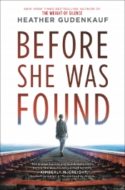
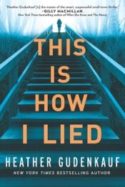

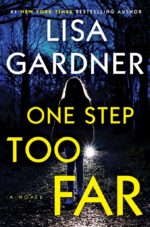
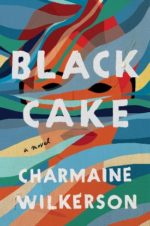
Comments are closed.